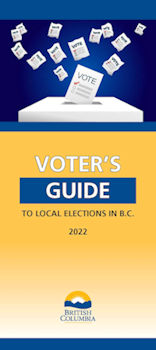Voting in local elections
Provincial legislation gives eligible B.C. residents the right to vote in general local elections and by-elections. This right is subject to certain restrictions, limitations and requirements. Additionally, local governments are required to provide access to voting, through various opportunities, such as an advance voting day.
Voter eligibility
The right to vote in local elections is conferred on resident electors and non-resident property electors.
Resident electors are persons that may be eligible to vote in local elections based on where they live. Non-resident property electors are persons that live in one municipality or electoral area and own property in a different municipality or electoral area where they can also vote. Students who attend educational institutions away from their place of residence may also be eligible to vote in local elections.
Eligible Indigenous and non-Indigenous electors living on Reserve are entitled to vote in general local elections.
Voter registration and voting
Registration
A local government may register electors for local elections in one of three ways – using same-day voter registration (e.g. at the time of voting), adopting (by bylaw) the Provincial Voters List as its register of electors (aka Voter’s List) or it can create and maintain its own register of electors.
Voting
General voting day is usually the most publicized or widely known voting opportunity resident electors and non-resident property electors have to cast their ballot in local elections.
At least one in-person advance voting opportunity must also be offered, and many jurisdictions offer more than this. There are two additional voting opportunities that may also be available to eligible electors: special voting; and, mail ballot voting. Each local government administers local elections and voting opportunities varies from one local government to the next.
Local Elections Legislation
Learn about voter eligibility and voting in local elections.
Guidance and resources
Elections BC
Contact information
Contact us if you have legislative questions about general local elections.
250 387-4020
1 800 663-7867


